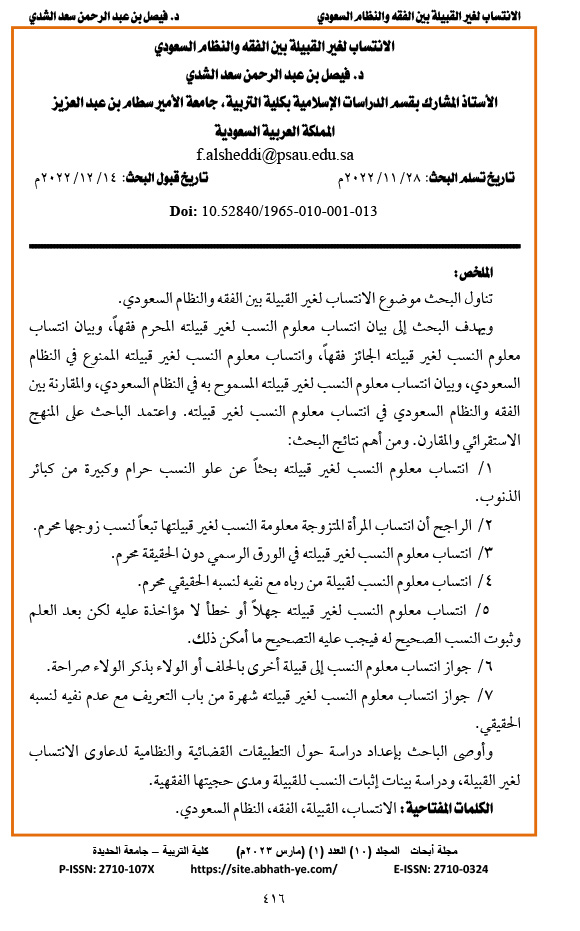Non-tribal Affiliation between Jurisprudence and the Saudi System
Keywords:
affiliation, tribe, jurisprudence, Saudi systemAbstract
Subject of the research: Non-tribal affiliation between jurisprudence and the Saudi system.
Objectives of the research: Clarifying the jurisprudentially forbidden affiliation of the ancestry-known person to other than his tribe – Stating the jurisprudentially allowed affiliation of the ancestry-known person to other than his tribe – Proclaiming forbidden affiliation of the ancestry-known person to other than his tribe in the Saudi system – Stating allowed affiliation of the ancestry-known person to other than his tribe in the Saudi system – Comparing of jurisprudence and the Saudi system regarding affiliation of the ancestry-known person to other than his tribe.
Research approach: inductive and comparative.
Most important findings: The affiliation of the ancestry-known person to other than his tribe seeking high ancestry is "haram" (forbidden) and one of the grievous sins – It is preponderant that a married ancestry-known woman's affiliation to other than her tribe (that of her husband's) is haram (forbidden) – Affiliation of the ancestry-known person to other than his tribe in the official paper only and not in reality is haram (forbidden) – Affiliation of the ancestry-known person to the tribe of the person who raised him with the denial of his real ancestry is haram (forbidden) – Affiliation of the ancestry-known person to other than his tribe ignorantly or by mistake is not an offense, but after knowing and establishing the correct ancestry, he must correct it whenever possible – The permissibility of affiliation of the ancestry-known person to other than his tribe by oath or allegiance with the explicit declaration of allegiance – The permissibility of affiliation of the ancestry-known person to other than his tribe as a nickname for identification, while not denying his or her true ancestry – The Saudi system forbids claims of lineage – The Saudi regime is in agreement with jurisprudence in this prohibition in order to close any outlets of dispute and to enforce the rule of "All matters should remain as they originally were" – The Saudi system excludes cases in claims of ancestry that are considered necessary for the preservation of rights, and this agrees with the jurisprudence that ascertains that "Necessity must be assessed and responded to proportionately" – The Saudi regime established, for those authorized by his Majesty the King to consider their claims’ proceedings, procedures regarding the power of attorney and bringing evidences, in accordance with the jurisprudence in the procedures of verification.
The most important recommendations: Conducting research in the judicial and systematic applications of non-tribal affiliation claims – Conducting research in the proofs of ascertaining tribe's affiliation and how they are jurisprudentially evidenced.

Downloads
Published
How to Cite
Issue
Section
License
Copyright (c) 2023 ِabhath Journal for the Humanities

This work is licensed under a Creative Commons Attribution 4.0 International License.
- البحوث المنشورة في المجلة مرخصة بموجب ترخيص (CC BY 4.0) Creative Commons Attribution 4.0 الدولي.
- تسمح المجلة بإعادة نسخ وتوزيع ونقل العمل لأي وسط أو شكل لأي غرض.
- تسمح بالتعديل والتحويل، والإضافة على العمل مع نسبة ذلك إلى المؤلف.
- حقوق النشر يحتفظ بها الباحثون.




